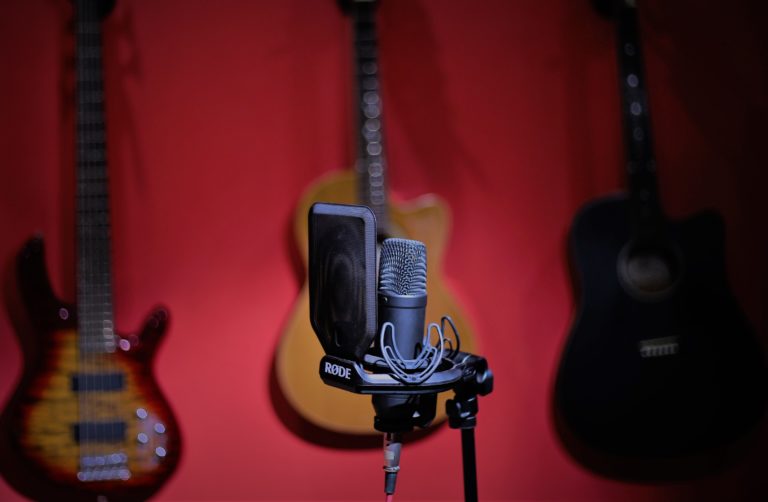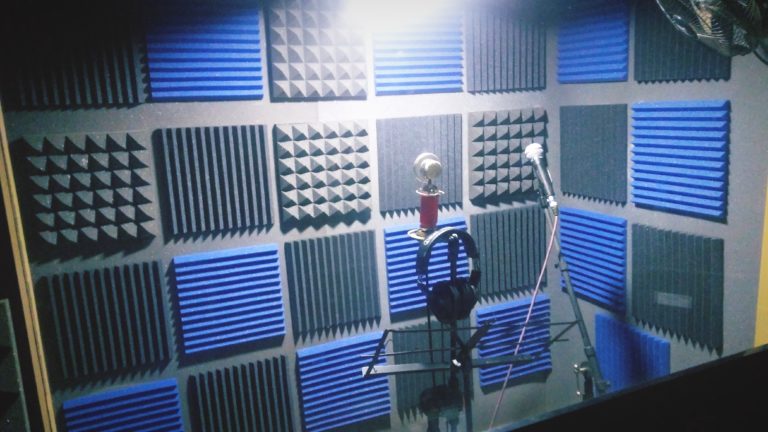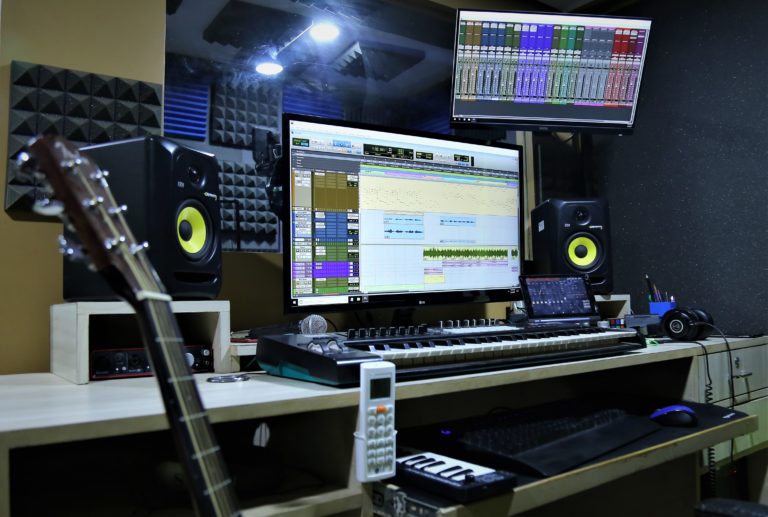Ajinkya’s Journey To Wavestream Studio
In Belgaum, officially known as Belagavi, lives Ajinkya Kudturkar – a music producer/mixing/recording artist and founder of Wavestream Studio. Since it’s inception in 2014, the studio provides solutions for Recording, Voice-overs & Dubbing, Music Production, Video Production, and Sound Mixing to individuals, corporate clients, and clients from the entertainment industry across India. Ajinkya took this pioneering step in the field of professional sound recording with technical skills & equipment to meet his client’s requirements.
It has brought a shift in times from before and now. Earlier artists had to travel to Pune, Mumbai, or Bangalore for recording. But now, with Wavestream Studio in Belgavi, artists can record right at their home turf. Today Ajinkya’s work has got recognition and is being praised by many. He has also been featured on local news media. But to have reached this level, he has faced challenges and struggles. To find out more, I decided to meet him and his passionate journey in the field of audio and music.
Here’s what he had to say.
When and how did the journey towards your passion begin?
I started learning to play the guitar as a hobby in 2009 when I was in 12th grade. After that, I slowly started making songs and compositions. But it still wasn’t serious until 2012-2013. I was with my former band Fallen Remenissions. It was more like a musician’s journey than a music producer. In 2014, I started thinking about making a studio because back then there was nothing like a professional studio in Belgaum. There were basic studios where you could record your vocals but not in the sense of music production. Hence I could consider it as a career. In 2014 December, I started working for clients in my small setup at home. And in 2015, I built this studio as I slowly developed an interest in recording and producing music.
What made you choose this path of music?
My passion for Music! A major thing that happened after my bachelor’s degree is that I had to decide about my career, whether to go for a Masters or start a business or work somewhere with whatever degree I had. That was the point I made this call of being a music producer & a recording engineer. Because I could feel that I could do this better than anything else in my life. I am from a commerce stream in academics. But I never felt that I could be a good accountant or something similar. I felt that this was easier for me even though I had to learn a lot, do a lot of things on my own. The artist in me was dominant. My parents played a major role in this too by not holding me back and letting me do something I believed in.
Did you have anybody to guide you?
Most of it is self-taught. I could never learn properly in a school or a classroom environment. I could always find myself learning better in the environment where I was learning by myself by researching or through the internet by joining online seminars to get answers to my questions related to anything, right from the top professionals in this industry across the world. Today’s modern technology has made it easier to get the required information. I started learning more about music theory and recording through the internet by myself. However, I completed Pro Tools certification from Bangalore and I am listed on their website as a certified professional. I have a few people in my contact who are really good at music production and well known for their works. I take advice from them at times. But most of this is my self taught journey.

What were the hurdles you faced when you decided to choose music as your career?
Yeah! A Major hurdle. A career only as a musician is a risk. It is a path where you will get a lot of competition and more than that making an income out of this is very hard. I think the studio is a business where you are not promoting yourself as a musician but helping artists by producing their records. The technical side is much safer than the artist or creative side of music. And I am in between both where I have a proper income and the artistic side of it. So making this call was not as tough as making a career just as a musician or a singer.
Were there any difficult times? If there were any, then what did keep you moving?
I think the beginning itself was difficult because I was all alone and was thinking whether this will work out or not. But I believe the best part you can do is to trust yourself all the time. At the end all you have is you. Even if there are some of them, they will support you in some things, and not everything. Right now where I am and where I was, I think this is much safer and I could see myself do this forever. All I did was I trusted myself and kept working as hard as I could.
Are there any artists who influenced you? How did they inspire you? Please name the top 3 of them.
Like everybody else in the scene, my favourites are the ones who are already famous and the ones you see on TV or mobile screen. Steven Wilson, Porcupine Tree and Tool these bands inspired me to develop the taste in music; Michel Jackson and his sense of music creation helped me learn the importance of “feel” of the music; Buckethead – an excellent guitarist, and I am a great fan of his instrumentals. Most of my favourite stars are from the western side because I started listening to Western music first, although I love Indian independent music scene indie bands, singers and some of the Bollywood songs too. Most of these artists had a hard journey and that inspired me because most of them started from nothing.

What are the milestones that Wavestream has already achieved?
Right now I have done almost 500 recordings including songs and voice-overs. Being in this city it is unlikely to work on one genre. People come very mixedly with different requirements and that is the best part of this. It is challenging. One day I record a pop/rock song, the second day I record an acoustic song, someday people just come for voice-overs or dubbing. This is a great opportunity to grow in this kind of environment.
Sometimes it so happens that if you are a good music producer in one genre, a specific type of people will come to you, for example, a Bollywood music producer will only get those types of projects because he has already made a name in that. It becomes very stagnant. Although it is much comfortable than working on the various genre, the challenges are less.
How is your client mix?
Most who come for song recordings are individual artists. They are either students or working somewhere. Some have a good knowledge of music. They have been singing for a long time or maybe classical trained.
In dubbing or voiceover, most of them come from the corporate sector because they have a business to promote; and Film production companies too.
Can you share your experience with the entertainment industry?
It was in the beginning, even before making the studio. I had no experience and started taking up assignments for the experience. I worked for movies named Tarang (Marathi) which was telecasted on Saam Marathi TV channel, Anamika (Kannada) a short film and B-Tweet (English). At that time I was in a stage of building this studio.
I also did dubbing for a serial which came on Udaya TV. I had two assistants back then who used to work under me. That was a great challenge. I had a privilege to work with some already famous artists in the Kannada TV industry who were from Bangalore. They were amazing artists to work with and the best part was, there were not many retakes. Usually, in dubbing or voiceover, people take a lot of takes to get perfection. But these guys were highly experienced in this, they hardly took any retake. Every day one episode of half an hour used to get recorded. They used to complete dubbing it within 2 hours. It is the best experience in my life about voice-overs/dubbing.
This was all during the first two years. It was a good start for me. During those days I used to work more for films. Now it is the opposite. I am more into music production than films.

Who do you compete with, setting a benchmark for your work?
The only competition for me is myself. I have set my benchmark in terms of the number of songs that I have to complete per month. And the most important part about making songs is that you need to be creative and you have to keep learning and doing something new. It should not be that your second song should sound similar to the first song. There should be a variety. Otherwise mentally you are not satisfied, thinking this is the same thing that you could have done in any corporate sector and earn money. I don’t want to be in that loop of doing the same thing. Here in this field, I am doing different things every day. It is like a small adventure. This is the norm that I follow.
Where do you see the Wavestream studio in the next 5 years?
Wavestream Studio has a good name in the city right now for producing a video, audio recording, etc. I think it will be more like a state-based or a district-based business in the long run.
As far as an artist, I see myself working with artists from different places outside Belgaum City. I have also worked with a few international artists on cover/original projects.
Ajinkya’s recent collaboration with artist Ashavari from Toronto, Canada:
What does it take to follow your passion for art and make it a career?
You have to set realistic goals. People these days know the term ‘’follow your passion’’, but they get blinded when it comes to doing it. There is nothing like a fixed plan. You need to do multiple things to get there. Set some goals and work on them daily and consistently. All these things take time, patience, experience. People need everything instantly these days. That does not happen. I am here for 5-6 years right now but still, I am learning. And I know I have a long way to go. Things take time, you have to understand that. Being Practical is the main thing.
Any message for the upcoming artists?
Just keep working on what you believe in. Keep practising. If you are consistent in one thing for years, inevitably, you will get something out of it. And it is not just about getting a good promotion, or money out of that. It is more about you being satisfied as an artist.

Too happy and proud to see your journey documented, AJ. I remember from our conversation back in 2016 that you also happen to be a first generation musician from your family, which would have been another massive challenge in making it to where you’re today.
All the very best. Keep it up.